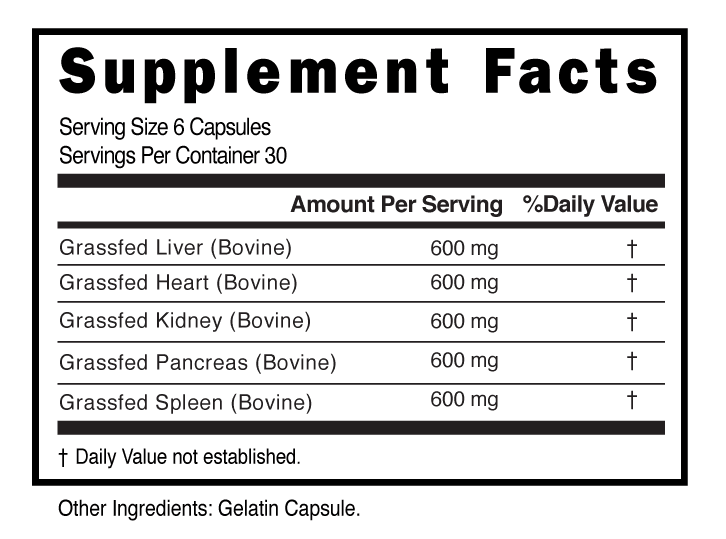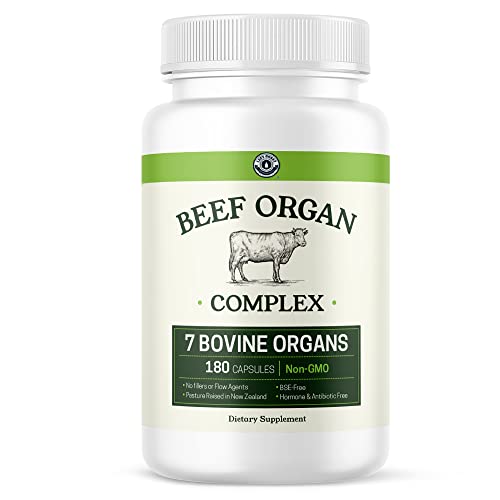I. Introduction
In a world constantly seeking natural solutions for health improvement, beef organ supplements have emerged as a noteworthy option. Understanding their benefits is crucial for making informed choices in enhancing overall well-being.
II. What are Beef Organ Supplements?
Beef organ supplements are derived from the organs of cattle, including the heart, liver, and kidneys. These supplements encapsulate the concentrated nutritional value of these organs, providing a convenient and accessible way to boost one’s nutrient intake.
III. Health Benefits
A. Boosting Overall Health
The comprehensive nutritional profile of beef organ supplements contributes to a general improvement in health. From vitamins to minerals, these supplements aim to fill nutritional gaps in our diet, promoting vitality and energy.
B. Specific Benefits for Different Organs

1. Heart
Beef heart supplements are rich in CoQ10, supporting cardiovascular health and improving blood circulation.
2. Liver
Liver supplements are known for their high vitamin A content, which is crucial for vision and immune function.
3. Kidneys
Kidney supplements provide essential minerals like selenium, aiding in detoxification and supporting kidney function.
IV. Dose and Timing
A. Recommended Dosage
It is advisable to follow the recommended dosage on the supplement packaging, ensuring that you meet your nutritional needs without exceeding safe limits. To enhance your experience with beef organ supplements, consider the following tips:
Start with a Low Dosage:
Begin with a lower dosage, especially if you are new to these supplements. Gradually increasing the amount allows your body to adapt.
Consult with a Healthcare Professional:
Before incorporating any new supplement into your routine, consult with a healthcare professional. They can provide personalized advice based on your health status and goals.
Individualize Based on Needs:
Assess your nutritional requirements, considering factors like age, weight, and dietary habits. This customization ensures the dosage aligns with your specific needs.

Consistent Timing:
Take your supplements at consistent times each day. Whether with meals or between them, a regular schedule helps optimize nutrient absorption.
Stay Hydrated:
Adequate water intake is essential for overall health and aids in the absorption of supplements. Ensure you stay hydrated throughout the day.
Monitor Your Body’s Response:
Pay attention to how your body reacts to the supplements. If you experience discomfort or unusual symptoms, consult a healthcare professional and adjust the dosage if needed.
Complement with a Balanced Diet:
Beef organ supplements should complement, not replace, a balanced diet. Incorporate a variety of foods to ensure comprehensive nutrition.
Avoid Self-Prescribing:
Resist the urge to self-prescribe higher dosages for faster results. Stick to the recommended dosage unless advised otherwise by a healthcare professional.
Proper Storage:
Follow the storage instructions on the packaging. Proper storage ensures the stability and effectiveness of the supplements.
Be Patient:
Results may take time. Allow your body to adapt and respond to the nutrients in the supplements. Consistency is key for long-term benefits.
B. Optimal Times for Consumption
To maximize the absorption of nutrients, consider taking beef organ supplements with meals. This can enhance the bioavailability of the nutrients, optimizing their effectiveness. Here are some additional tips to make the most of the optimal consumption timing:
Pair with Nutrient-Rich Foods:
Take your beef organ supplements with meals that include a variety of nutrient-rich foods. This synergistic effect can complement the nutritional profile of the supplements.
Include Healthy Fats:
Consuming healthy fats alongside your supplements, such as those found in avocados or olive oil, can aid in the absorption of fat-soluble vitamins present in beef organ supplements.
Avoid Caffeine and Antacids:
Steer clear of consuming caffeine or antacids close to the time you take your supplements. These substances may interfere with nutrient absorption, so it’s best to create a time gap.
Consistency is Key:
Try to take your supplements at the same time each day. This consistency not only helps establish a routine but also supports a steady intake of nutrients for your body.
Space Out Calcium-Rich Foods:
If your beef organ supplement contains calcium, avoid consuming it alongside other calcium-rich foods or supplements. Spacing them out can prevent potential interference with absorption.
Listen to Your Body:
Pay attention to how your body responds when taking supplements with meals. If you experience any discomfort or digestive issues, it may be beneficial to adjust the timing or consult with a healthcare professional.
Consider the Type of Meal:
While it’s generally recommended to take supplements with meals, certain meals may be more conducive to absorption. For instance, a well-balanced meal with a mix of proteins, carbohydrates, and vegetables can provide an ideal environment for nutrient absorption.
Stay Hydrated:
Ensure you drink water with your meals and supplements. Hydration supports the digestion and absorption processes, enhancing the overall effectiveness of the supplements.
Take into Account Medication Timing:
If you are on medication, be mindful of the timing of your supplements to your medications. Some medications may require a specific time gap for optimal absorption.
Adjust for Personal Preferences:
Everyone’s body is different, and individual preferences may vary. If taking supplements with meals doesn’t suit you, find a routine that aligns with your lifestyle while ensuring consistent intake.
V. Choosing the Right Supplement
A. Considerations for Different Age Groups
Tailoring supplements to age-specific nutritional needs is crucial. Consult a healthcare professional to determine the right supplement for you or your family. Additionally, keep the following considerations in mind:
Pediatric Considerations:
For children, it’s essential to choose supplements that are specifically formulated for their age group. Pediatric formulations often contain adjusted dosage levels suitable for growing bodies.
Adolescent Growth:
During the adolescent years, nutrient requirements increase due to rapid growth and development. Consider supplements that support bone health with adequate calcium and vitamin D.
Adult Maintenance:
Adults may require different supplements based on factors such as gender, lifestyle, and overall health. For instance, pregnant or lactating women may need specialized supplements for prenatal care.
Senior Nutritional Needs:
As individuals age, there may be a decrease in nutrient absorption. Supplements for seniors often focus on maintaining bone density, cognitive function, and heart health.
Specialized Formulations:
Some supplements cater to specific age-related concerns, such as joint health or cognitive support. Explore formulations designed to address these specific needs within different age groups.
By taking into account these age-specific considerations and seeking guidance from healthcare professionals, you can ensure that the chosen supplements align with the unique nutritional requirements of each age group, promoting optimal health and well-being.
B. Tailoring Supplements for Specific Diseases
Certain organ supplements may be more beneficial for specific health conditions. Understanding these nuances ensures that you harness the full potential of the supplements. Consider the following insights to tailor supplements for specific diseases:
Cardiovascular Health:
Beef heart supplements, rich in CoQ10, may be particularly beneficial for individuals aiming to support cardiovascular health. CoQ10 plays a vital role in energy production and antioxidant protection for the heart.
Liver Health:
Supplements derived from the liver can be advantageous for those looking to support liver health. They are often rich in vitamin A, which is crucial for detoxification and maintaining liver function.
Renal Support:
Kidney supplements, containing essential minerals like selenium, can aid in supporting kidney function. This may be particularly relevant for individuals concerned about kidney health or dealing with kidney-related conditions.
Metabolic Disorders:
Some organ supplements offer benefits for individuals dealing with metabolic disorders. Consulting with a healthcare professional can help determine the suitability of these supplements based on the specific disorder.
Autoimmune Conditions:
For those managing autoimmune conditions, certain organ supplements may provide nutrients that support the immune system without exacerbating the condition. Always consult with a healthcare professional for personalized advice.
Understanding the targeted benefits of organ supplements allows individuals to make informed choices based on their unique health concerns. It’s crucial to consult with healthcare professionals to ensure that the chosen supplements align with treatment plans and contribute positively to overall health.
VI. Comparing Beef Organ Supplements
A. Popular Brands in the Market
Several brands offer beef organ supplements. Research and compare these brands to find the one that aligns with your preferences and values.
B. Key Differences and Advantages
Consider the differences in formulation, sourcing, and additional ingredients when choosing a beef organ supplement. Understanding these nuances will help you make an informed decision.
VII. Potential Side Effects
A. Common Side Effects
While beef organ supplements are generally safe, some individuals may experience mild side effects, such as digestive discomfort. Monitoring your body’s response is essential.
B. Precautions to Take
If you have allergies or pre-existing health conditions, consult with a healthcare professional before incorporating beef organ supplements into your routine. This precaution ensures a safe and effective experience.
VIII. Tips for Safe Consumption
A. Consulting with a Healthcare Professional
Before starting any new supplement regimen, seek advice from a healthcare professional. They can provide personalized guidance based on your health status and goals.
B. Monitoring for Allergic Reactions
Pay attention to any allergic reactions, such as itching or swelling, and discontinue use if these symptoms persist. It’s essential to prioritize safety and well-being.
IX. Medical Researcher References
A. Studies Supporting the Benefits
Scientific studies have shown the potential benefits of beef organ supplements, highlighting their role in improving specific health markers. Refer to reputable research to understand the scientific backing.
B. Scientific Findings on Beef Organ Supplements
Explore scientific literature for in-depth insights into the composition and effects of beef organ supplements. Understanding the research can provide a solid foundation for your decision-making.
X. Conclusion
In conclusion, beef organ supplements offer a natural and concentrated source of essential nutrients. By incorporating them into your routine with consideration of dosage, timing, and individual health factors, you can harness their benefits for overall well-being.
FAQs
- Are beef organ supplements suitable for vegetarians?
- Beef organ supplements are not suitable for vegetarians, as they are derived from animal organs.
- Can I take multiple organ supplements simultaneously?
- While it’s possible, it’s crucial to consult with a healthcare professional to ensure balanced nutrient intake and avoid excessive consumption.
- Are there age restrictions for beef organ supplements?
- While there are no strict age restrictions, consulting with a healthcare professional can help tailor the supplements to specific age-related nutritional needs.
- How long does it take to see the benefits of beef organ supplements?
- The timeline for experiencing benefits may vary. Consistent use over weeks to months is often recommended for noticeable effects.
- Can beef organ supplements replace a balanced diet?
- No, beef organ supplements should complement a balanced diet and not replace it. A varied and nutritious diet is essential for overall health.
